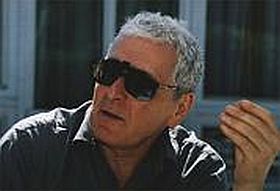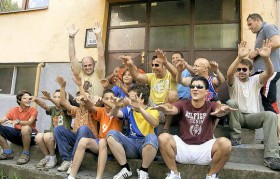”Trigorin got Arkadina pregnant” bemærker en kollega da Olivia ved en lille festmiddag lidt inde i filmen røber sin graviditet. Ja, det handler om teater, det ser jeg selvfølgelig straks i åbningen, og det handler i en arbejdende gruppe om en bestemt skuespiller, en bestemt kvinde især, det er tydeligt. Snart ved jeg så at der er én mere, en mand. De hedder Olivia og Serge og de kan spille Desdemona og Othello har de vist og de spiller nu Arkadina og Trigorin, skuespillerinden og forfatteren i Anton Tjekhovs Mågen som gruppen sætter op, og ved siden af hinanden og sammen lever de deres egne liv og det kan de også fremstille, de roller kan de også spille, professionelle som de er, og det sker i filmen her som handler om hvordan deres liv og deres arbejde udvikler sig gennem nogle udfordrende måneder.
I titelsekvensens dans på scenen bliver skuespilleren Olivia væk i rollen Arkadina, væk fra sin anden virkeligheds dans med og eget lykkelige forhold til Serge, forelskelsen klippes hurtigt og tydeligt og smukt frem, jeg ser at hun ser ham hele tiden. Åh, fotografens følsomme opmærksomhed for hendes bliks retninger i den stadigt hurtigere dansescene og klipperens lige så præcisise anbringelse af et vigtigt flash back.
Midt under dette bliver der allerede her plads til instruktørens bemærkninger til skuespillerne om Tjekhovs metode, hans nuancer er vanskelige at ramme uden dialog siger hun. Underteksten, stemningen. Ligesom fortællingerne bygger han sine stykker på et fint samspil mellem tekst og undertekst, mellem det replikkerne indeholder, og det der meddeleles med andre midler: tonefaldet, forskellige lyde som baggrundsmusik, nattevagtens larmen, den bristende streng i kirsebærhaven, associationsladede genstande som den symbolske måge, pauser, stumme scener (Nils Åke Nilsson, 474). Lægen Dorn har hos Tjekhov denne replik: ”Der er ikke noget at forstå. Det er fuldstændig klart. (Pause)” (Anton Chechov, 31), Olivia som Arkadina har en replik om at forsvinde ind i sygdommen, ind i sindssygen. Og denne ”Hun mister frugten af deres kærlighed, hun er den eneste som kæmper, som en måge i storm”. Filmmusikken får mig til at tænke på Virginia Woolf, det er en lang privat associationsrække som musik kan, det passer mig perfekt.
Hjemme er de to elskende så i gang med graviditetsprøven. De skal tage tid, det tager to minutter at synge sangen om at forelske sig i hinanden. Han vil fortælle nyheden til de andre, hun vil vente. De elsker, må vi det nu? Igen en scene fra teaterarbejdet, sminke og afsminke. Spejlet, maskerne. Det kulminerer stilfærdigt med hendes skuffede ansigt ved den lille fest med kollegerne hvor det går op for hende at hun ikke kan komme med til premieren i New York og Montreal og turneen bagefter.
Ja, det handler selvfølgelig om kvinden i svangerskab, i valg mellem graviditet og arbejde som ikke uden videre kan være det lykkelige både-og, valg mellem graviditet og sex, mellem graviditet og samliv med kæresten – det er realiteterne som også Tjekhov ville vægte.
Og så ved den samme fest opdager Arkadina ude på toilettet, kameraet er med, at noget er galt, der er blod på toiletpapiret, Serge kommer til, og filmen, kameraet er med hende og Serge på sygehuset til ultralydscanning og lægen fortæller dem at barnet har det godt men viser dem også på skærmen en 8 cm blodsamling i livmoderen og råder indtrængende Arkadina til fuldstændig fysisk ro uden belastninger med at bære, og de og jeg tænker med det samme på den smukke trappe til deres lejlighed højt oppe som vi har lært at kende i en af filmens første smukke etablerende scener.
Det her lyder trivielt skønt alvorligt, men det mærkelige er at det er blevet til vidunderlig film fyldt med fryd og ægthed skabt af en instruktion, et kameraarbejde og et klippearbejde som ikke svigter filmen et sekund. Historien er konstrueret som hos Tjekhov: ”I modsætning til det ’perfekte’ intrigedrama, der dengang dominerede teatret, søger Tjekhov at skyde handlingen i baggrunden og i stedet koncentrere sig om en række jævne, almindelige menneskeskæbner, der næsten umærkeligt, uden markerede dramatiske effeker eller konflikter, griber ind i og belyser hinanden: ’Lad alt på scenen være netop så kompliceret og samtidig så enkelt, som det er i livet. Folk spiser middag, og samtidig fuldbyrdes deres lykke, eller deres liv bryder sammen.’ ”(Nils Åke Nilsson, 474)
Måske ligger her nøglen til at Petra Costas og Lea Globs film placerer sig så ubestrideligt sikker i sin flotte og rene hybride form. I mit liv med film er dette nye filmværk vist nok den lykkeligste ophævelse af den evige skelnen mellem fiktion og dokumentar, mellem journalistik og kunst, mellem teaterets virkelighed og den konventionelle virkelighed som i Mågen, som hos Omar Amarilay har jeg lige lært hedder realiteterne og det imaginære og som i filmens titel er modstillingen det endnu ufødte barn Olmo og skuespillet Mågen under opsætning (Louis Malles Vanja på 42. gade er selvfølgelig en oplagt parallel men med et andet emne og mindre ligetil, mindre sandt naiv). Det er i min tilskuerverden et vidunderlig gennembrud for bare at kunne skrive ordet film uden at tilføje kort eller lang, tv eller biograf, dokumentar- eller spillefilm.
Med så tætpakket en film kan jeg i biografsædet i det højeste nå måske at komme på sporet af kernen, af det som er den egentlige drivkraft i værket. Men jeg er nødt til at skrive, at jeg ikke oplever dette kunstnerisk inderste som problemstillingen for en kvinde som gerne både vil være gravid og fortsætte med at arbejde skabende som kunstner. I hvert fald ikke kun det. Jeg tror det her også, ja især handler om selve kunstens væsen. Om både Olmo og om Mågen, ok – men af visse grunde blev jeg især optaget af Mågen. Min oplevelse er at Petra Costa og Lea Glob har lavet et filmmanifest i form af en skøn historie, en skøn film med skønne, almindelige, levende mennesker i en hverdag af arbejde og kunst, en tænksomt gribende kærlighedshistorie og et klogt energisk æstetisk nybrud.
Danmark, 2014. 87 min. (Vurdering: 6/6)
SYNOPSIS
Olivia’s free bohemian life as an artist and stage actress takes a dramatic turn when she and her boyfriend Serge discover that she is pregnant. But the emotionally intense period that follows in the wake of the news, unfolds like a sensitive blend of spontaneity and staged ‘reenactments’ of an emotionally intense episode from the two actors’ own life – and like a poetic and existential dive into Olivia’s state (of mind) during her pregnancy. For the good news comes with a dilemma: their small theatre company of close friends has been invited to stage Chekhov’s ‘The Seagull’ in New York, but Olivia is prevented by her growing belly. Lea Glob and Petra Costa’s joint film gets both its power and its sensitivity from the hybrid between fiction and a fragile, emotional authenticity, that not even a professional actor can perform. For how do you know what actors actually feel like themselves? ‘Olmo and the Seagull’ is a modern hybrid film with classical roots in theatre arts and in Virginia Woolf’s novel ‘Mrs. Dalloway’. (CPHDOX festival)
A journey through the labyrinth of a woman’s mind, OLMO AND THE SEAGULL tells the story of Olivia, a free-spirited stage actress preparing for a starring role as Arkadina in a theatrical production of Chekhov’s The Seagull. As the play starts to take shape, Olivia and her boyfriend, Serge, whom she first met on the stage of the Theatre du Soleil, discover she is pregnant.
Initially, she thinks she can have it all, until an unexpected setback threatens her pregnancy and brings her life to a standstill. Olivia’s desire for freedom and success clashes with the limits imposed by her own body and the baby growing inside her. The months of her pregnancy unfold as a rite of passage, forcing the actress to confront her deepest fears. She looks in the mirror and sees both female characters of The Seagull – Arkadina, the aging actress, and Nina, the actress that falls into madness – as unsettling reflections of herself.
The film takes a further twist when what appears to be acted is revealed as life itself. This portrait of the creative process invites us to question what is real, what is imagined, and what we celebrate and sacrifice in life. (Locarno Festival)
LITTERATUR / LINKS:
Anton Tjechov: Mågen, dansk oversættelse, 1970. Nils Åke Nilsson: Den russiske litteratur i F. J. Billeskov Jansen m.fl., red.: Verdens litteratur historie 10, 1973.
http://cphdox.dk/en/screening/olmo-seagull
http://www.dfi.dk/faktaomfilm/film/da/90866.aspx?id=90866
BIOGRAFVISNINGER
Filmen rejser på turne i de danske biografer med start den 7. september, og Zentropa har indledt samarbejder med teatre rundt om i landet samt sat forskellige fra teatermiljøet stævne for at tale med dem om blandt andet moderskab og karriere og livet ved teatret i Q & A sessions efter filmen er vist. Se planen for arrangementerne her:
http://www.zentropa.dk/news/opret_nyhed/?newsid=211
PS
Jeg er slet slet ikke færdig med arbejdet, jeg skal læse Tjekhov, jeg skal læse om teatret i Paris, jeg skal se Louis Malles Vanja på 42. gade igen og især skal jeg se Petra Costas så roste film Elena, Jeg skal se Lea Globs dejlige Mødet med min far Kasper Højhat igen, og pludselig tænker jeg at Mågen også handler om teatrets kunst som også ofte Bergmans film skildrer teateropsætningens og skuespillets erkendelsesmetode. Så jeg må gense Bergman. Og så er der det med Vildanden og Mågen, med Ibsen og Tjekhov, ”Ibsen kender ikke livet” skal Tjekhov have sagt (Nilsson, 229f). Der er meget for en biografgænger at tage fat på efter en så rig filmoplevelse.




